International Crisis: Analyzing Iran, EU, USA & Israel Relations
VerifiedAdded on 2023/06/12
|11
|3084
|226
Essay
AI Summary
This essay explores the international crisis arising from the 2015 US-Iran nuclear deal, examining its reception and impact on global relations. It delves into the historical context of US sanctions against Iran, the allegations of Weapons of Mass Destruction (WMD) development, and Iran's repeated denials and commitment to peaceful nuclear technology. The analysis includes the perspectives of various international players, such as the United States, the European Union, and Israel, highlighting their differing stances and concerns regarding the deal. The essay also addresses the role of intelligence agencies, the UN Security Council sanctions, and the complexities of balancing relationships with allies like Israel and Saudi Arabia. Ultimately, the essay emphasizes the need for confidence-building measures and dialogue to prevent further escalation of tensions in the Middle East, advocating for a fair and unbiased assessment of the nuclear deal to foster stability.
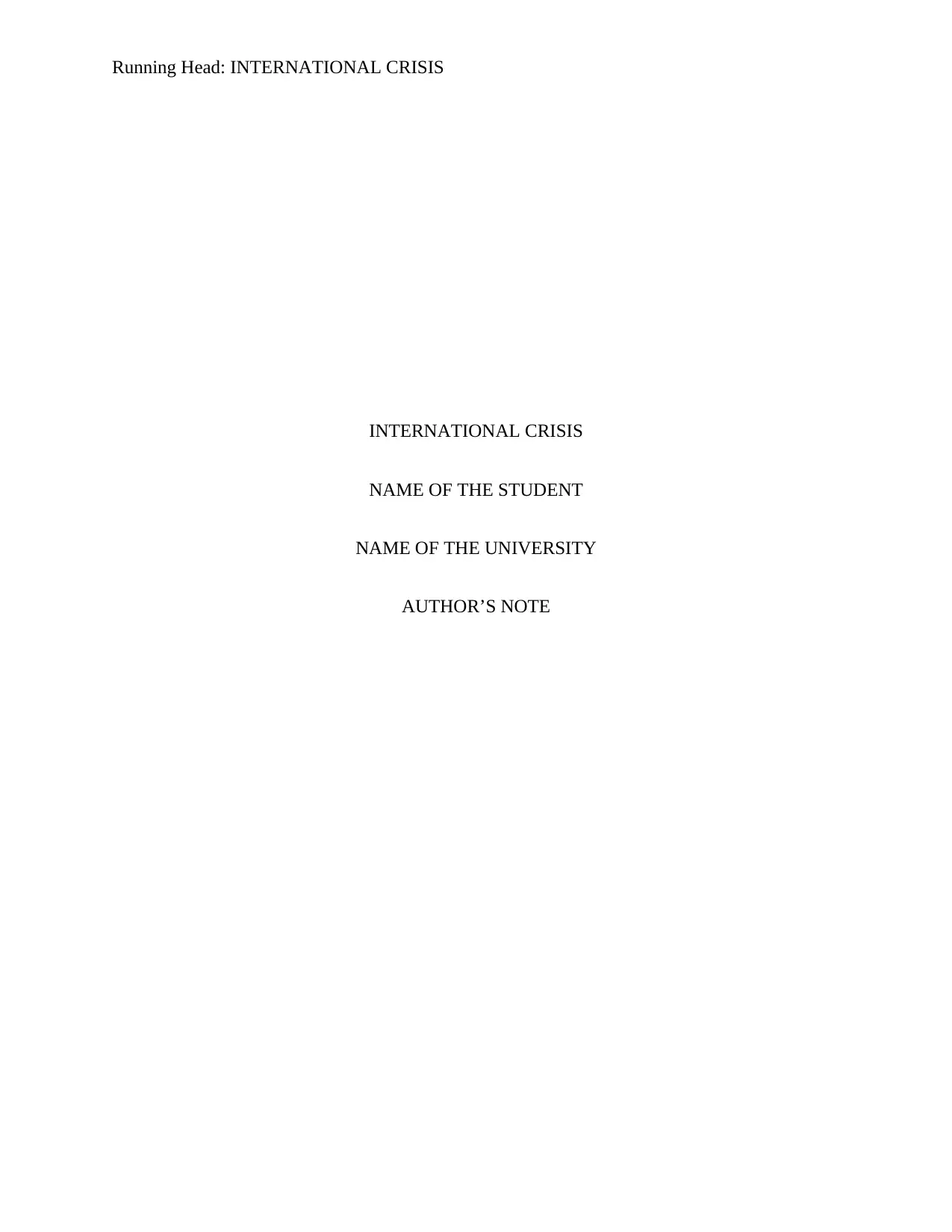
Running Head: INTERNATIONAL CRISIS
INTERNATIONAL CRISIS
NAME OF THE STUDENT
NAME OF THE UNIVERSITY
AUTHOR’S NOTE
INTERNATIONAL CRISIS
NAME OF THE STUDENT
NAME OF THE UNIVERSITY
AUTHOR’S NOTE
Paraphrase This Document
Need a fresh take? Get an instant paraphrase of this document with our AI Paraphraser
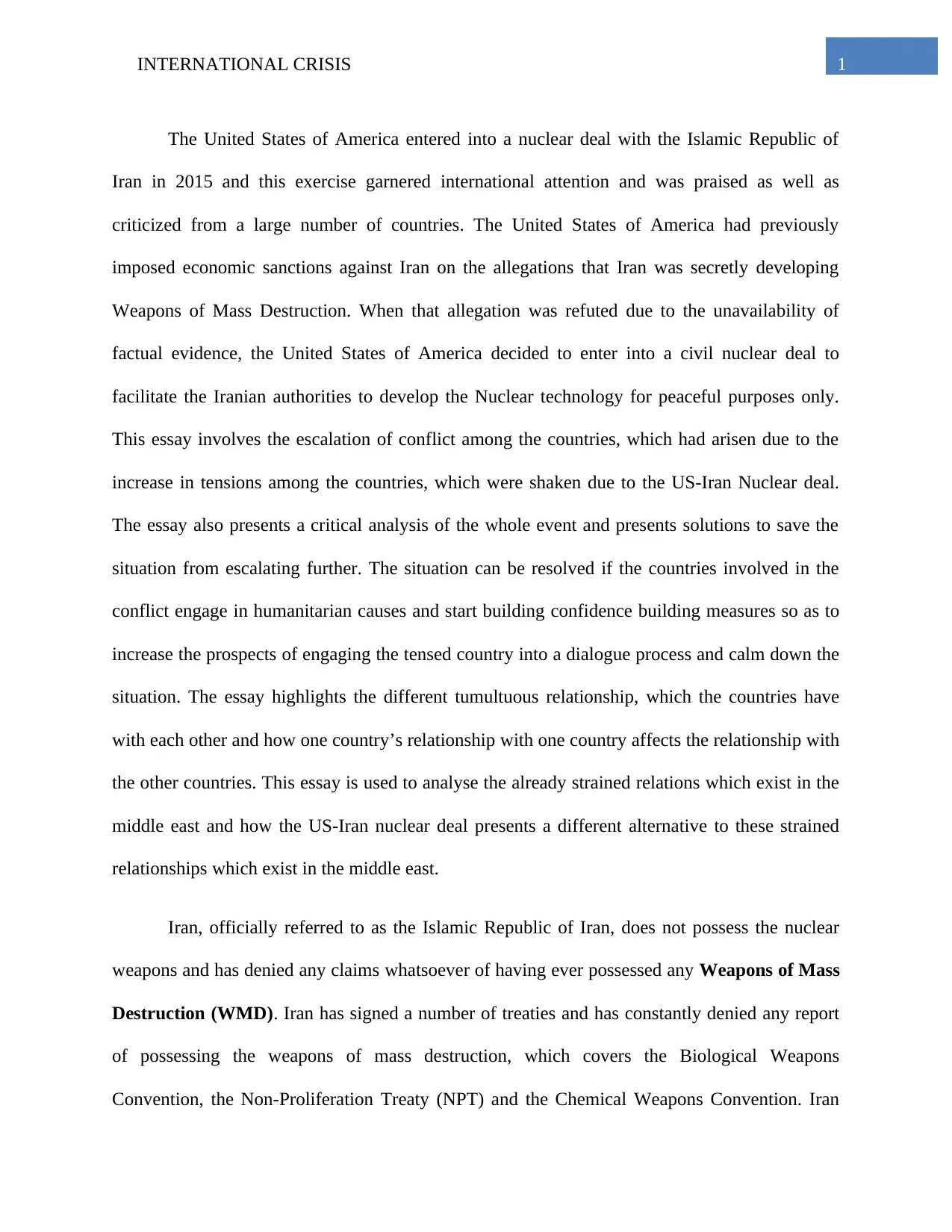
1INTERNATIONAL CRISIS
The United States of America entered into a nuclear deal with the Islamic Republic of
Iran in 2015 and this exercise garnered international attention and was praised as well as
criticized from a large number of countries. The United States of America had previously
imposed economic sanctions against Iran on the allegations that Iran was secretly developing
Weapons of Mass Destruction. When that allegation was refuted due to the unavailability of
factual evidence, the United States of America decided to enter into a civil nuclear deal to
facilitate the Iranian authorities to develop the Nuclear technology for peaceful purposes only.
This essay involves the escalation of conflict among the countries, which had arisen due to the
increase in tensions among the countries, which were shaken due to the US-Iran Nuclear deal.
The essay also presents a critical analysis of the whole event and presents solutions to save the
situation from escalating further. The situation can be resolved if the countries involved in the
conflict engage in humanitarian causes and start building confidence building measures so as to
increase the prospects of engaging the tensed country into a dialogue process and calm down the
situation. The essay highlights the different tumultuous relationship, which the countries have
with each other and how one country’s relationship with one country affects the relationship with
the other countries. This essay is used to analyse the already strained relations which exist in the
middle east and how the US-Iran nuclear deal presents a different alternative to these strained
relationships which exist in the middle east.
Iran, officially referred to as the Islamic Republic of Iran, does not possess the nuclear
weapons and has denied any claims whatsoever of having ever possessed any Weapons of Mass
Destruction (WMD). Iran has signed a number of treaties and has constantly denied any report
of possessing the weapons of mass destruction, which covers the Biological Weapons
Convention, the Non-Proliferation Treaty (NPT) and the Chemical Weapons Convention. Iran
The United States of America entered into a nuclear deal with the Islamic Republic of
Iran in 2015 and this exercise garnered international attention and was praised as well as
criticized from a large number of countries. The United States of America had previously
imposed economic sanctions against Iran on the allegations that Iran was secretly developing
Weapons of Mass Destruction. When that allegation was refuted due to the unavailability of
factual evidence, the United States of America decided to enter into a civil nuclear deal to
facilitate the Iranian authorities to develop the Nuclear technology for peaceful purposes only.
This essay involves the escalation of conflict among the countries, which had arisen due to the
increase in tensions among the countries, which were shaken due to the US-Iran Nuclear deal.
The essay also presents a critical analysis of the whole event and presents solutions to save the
situation from escalating further. The situation can be resolved if the countries involved in the
conflict engage in humanitarian causes and start building confidence building measures so as to
increase the prospects of engaging the tensed country into a dialogue process and calm down the
situation. The essay highlights the different tumultuous relationship, which the countries have
with each other and how one country’s relationship with one country affects the relationship with
the other countries. This essay is used to analyse the already strained relations which exist in the
middle east and how the US-Iran nuclear deal presents a different alternative to these strained
relationships which exist in the middle east.
Iran, officially referred to as the Islamic Republic of Iran, does not possess the nuclear
weapons and has denied any claims whatsoever of having ever possessed any Weapons of Mass
Destruction (WMD). Iran has signed a number of treaties and has constantly denied any report
of possessing the weapons of mass destruction, which covers the Biological Weapons
Convention, the Non-Proliferation Treaty (NPT) and the Chemical Weapons Convention. Iran
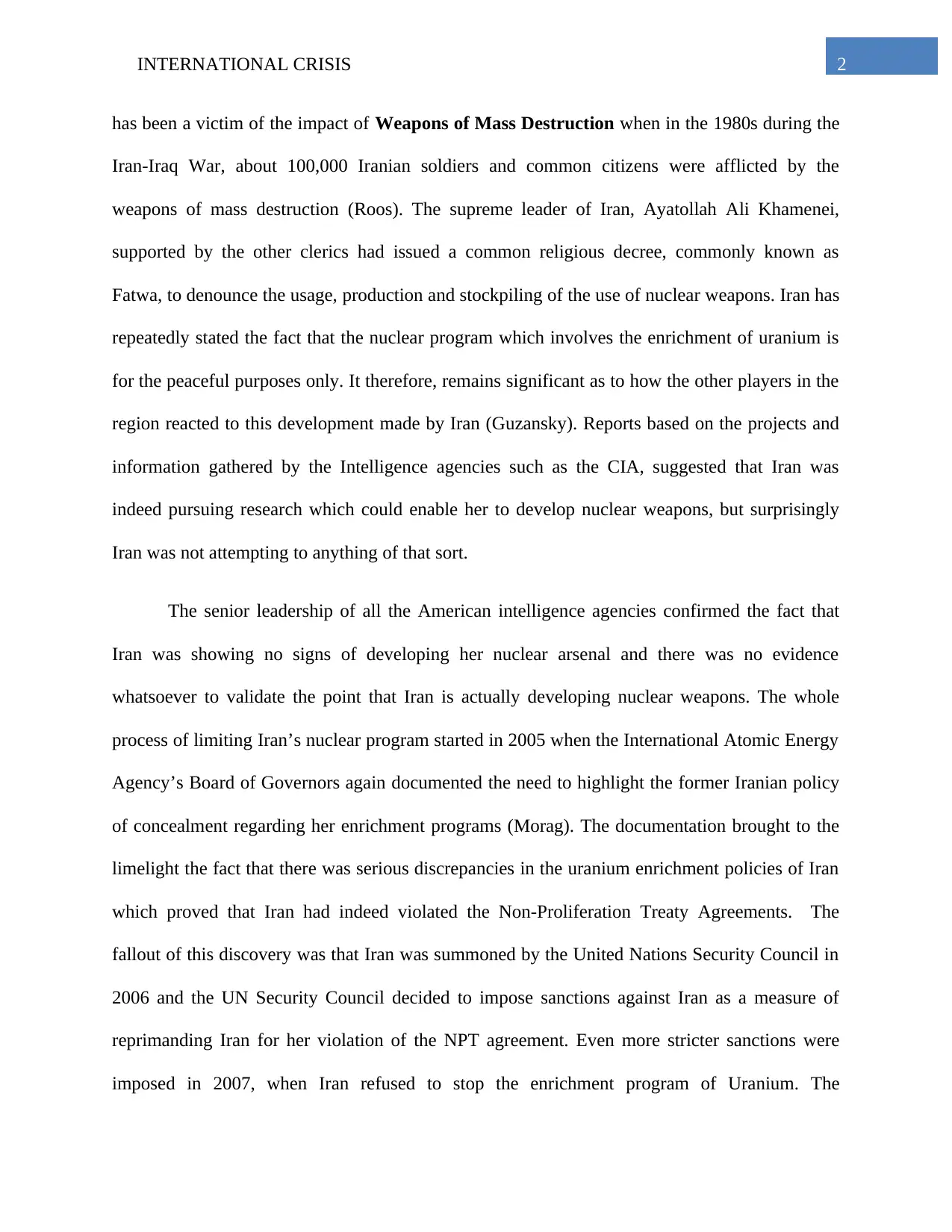
2INTERNATIONAL CRISIS
has been a victim of the impact of Weapons of Mass Destruction when in the 1980s during the
Iran-Iraq War, about 100,000 Iranian soldiers and common citizens were afflicted by the
weapons of mass destruction (Roos). The supreme leader of Iran, Ayatollah Ali Khamenei,
supported by the other clerics had issued a common religious decree, commonly known as
Fatwa, to denounce the usage, production and stockpiling of the use of nuclear weapons. Iran has
repeatedly stated the fact that the nuclear program which involves the enrichment of uranium is
for the peaceful purposes only. It therefore, remains significant as to how the other players in the
region reacted to this development made by Iran (Guzansky). Reports based on the projects and
information gathered by the Intelligence agencies such as the CIA, suggested that Iran was
indeed pursuing research which could enable her to develop nuclear weapons, but surprisingly
Iran was not attempting to anything of that sort.
The senior leadership of all the American intelligence agencies confirmed the fact that
Iran was showing no signs of developing her nuclear arsenal and there was no evidence
whatsoever to validate the point that Iran is actually developing nuclear weapons. The whole
process of limiting Iran’s nuclear program started in 2005 when the International Atomic Energy
Agency’s Board of Governors again documented the need to highlight the former Iranian policy
of concealment regarding her enrichment programs (Morag). The documentation brought to the
limelight the fact that there was serious discrepancies in the uranium enrichment policies of Iran
which proved that Iran had indeed violated the Non-Proliferation Treaty Agreements. The
fallout of this discovery was that Iran was summoned by the United Nations Security Council in
2006 and the UN Security Council decided to impose sanctions against Iran as a measure of
reprimanding Iran for her violation of the NPT agreement. Even more stricter sanctions were
imposed in 2007, when Iran refused to stop the enrichment program of Uranium. The
has been a victim of the impact of Weapons of Mass Destruction when in the 1980s during the
Iran-Iraq War, about 100,000 Iranian soldiers and common citizens were afflicted by the
weapons of mass destruction (Roos). The supreme leader of Iran, Ayatollah Ali Khamenei,
supported by the other clerics had issued a common religious decree, commonly known as
Fatwa, to denounce the usage, production and stockpiling of the use of nuclear weapons. Iran has
repeatedly stated the fact that the nuclear program which involves the enrichment of uranium is
for the peaceful purposes only. It therefore, remains significant as to how the other players in the
region reacted to this development made by Iran (Guzansky). Reports based on the projects and
information gathered by the Intelligence agencies such as the CIA, suggested that Iran was
indeed pursuing research which could enable her to develop nuclear weapons, but surprisingly
Iran was not attempting to anything of that sort.
The senior leadership of all the American intelligence agencies confirmed the fact that
Iran was showing no signs of developing her nuclear arsenal and there was no evidence
whatsoever to validate the point that Iran is actually developing nuclear weapons. The whole
process of limiting Iran’s nuclear program started in 2005 when the International Atomic Energy
Agency’s Board of Governors again documented the need to highlight the former Iranian policy
of concealment regarding her enrichment programs (Morag). The documentation brought to the
limelight the fact that there was serious discrepancies in the uranium enrichment policies of Iran
which proved that Iran had indeed violated the Non-Proliferation Treaty Agreements. The
fallout of this discovery was that Iran was summoned by the United Nations Security Council in
2006 and the UN Security Council decided to impose sanctions against Iran as a measure of
reprimanding Iran for her violation of the NPT agreement. Even more stricter sanctions were
imposed in 2007, when Iran refused to stop the enrichment program of Uranium. The
⊘ This is a preview!⊘
Do you want full access?
Subscribe today to unlock all pages.

Trusted by 1+ million students worldwide
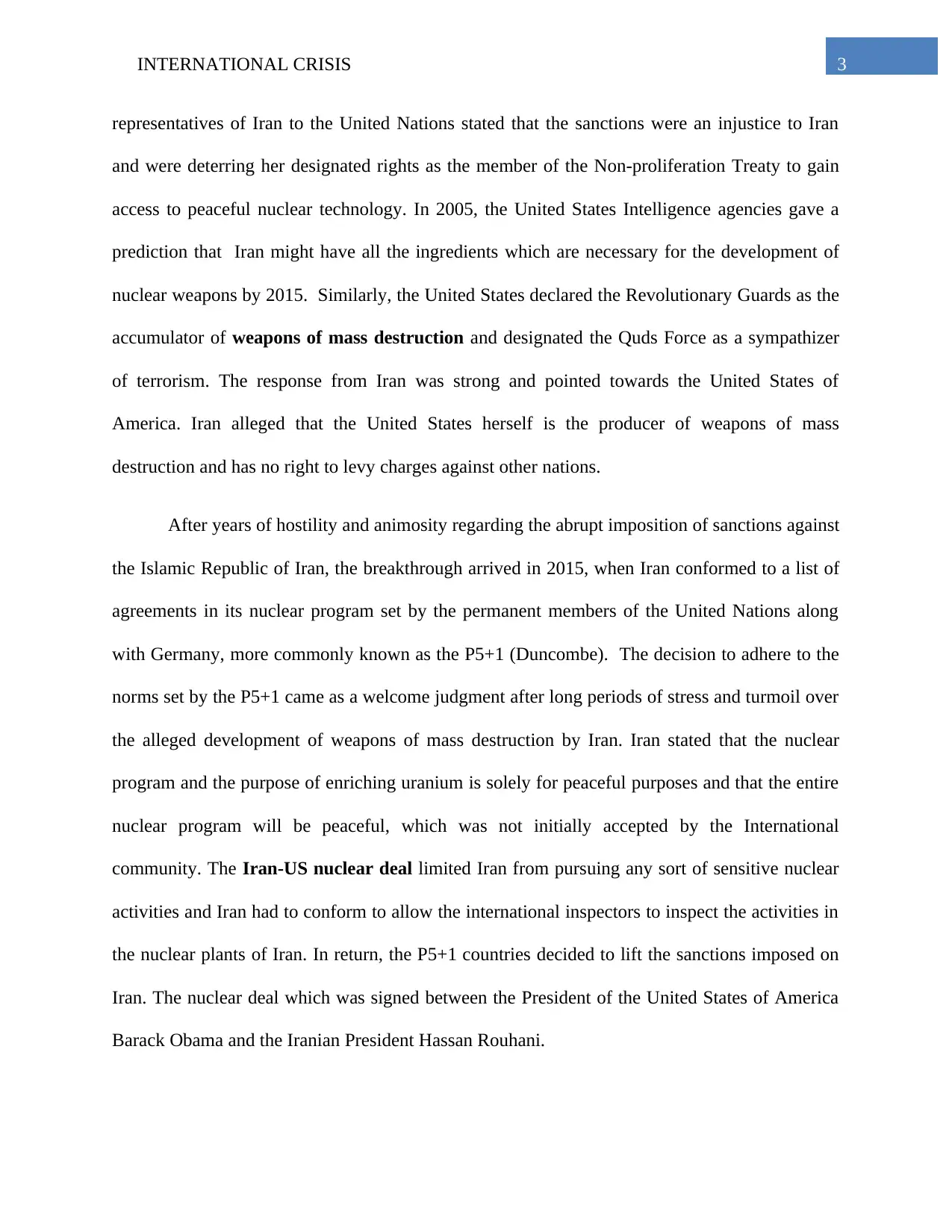
3INTERNATIONAL CRISIS
representatives of Iran to the United Nations stated that the sanctions were an injustice to Iran
and were deterring her designated rights as the member of the Non-proliferation Treaty to gain
access to peaceful nuclear technology. In 2005, the United States Intelligence agencies gave a
prediction that Iran might have all the ingredients which are necessary for the development of
nuclear weapons by 2015. Similarly, the United States declared the Revolutionary Guards as the
accumulator of weapons of mass destruction and designated the Quds Force as a sympathizer
of terrorism. The response from Iran was strong and pointed towards the United States of
America. Iran alleged that the United States herself is the producer of weapons of mass
destruction and has no right to levy charges against other nations.
After years of hostility and animosity regarding the abrupt imposition of sanctions against
the Islamic Republic of Iran, the breakthrough arrived in 2015, when Iran conformed to a list of
agreements in its nuclear program set by the permanent members of the United Nations along
with Germany, more commonly known as the P5+1 (Duncombe). The decision to adhere to the
norms set by the P5+1 came as a welcome judgment after long periods of stress and turmoil over
the alleged development of weapons of mass destruction by Iran. Iran stated that the nuclear
program and the purpose of enriching uranium is solely for peaceful purposes and that the entire
nuclear program will be peaceful, which was not initially accepted by the International
community. The Iran-US nuclear deal limited Iran from pursuing any sort of sensitive nuclear
activities and Iran had to conform to allow the international inspectors to inspect the activities in
the nuclear plants of Iran. In return, the P5+1 countries decided to lift the sanctions imposed on
Iran. The nuclear deal which was signed between the President of the United States of America
Barack Obama and the Iranian President Hassan Rouhani.
representatives of Iran to the United Nations stated that the sanctions were an injustice to Iran
and were deterring her designated rights as the member of the Non-proliferation Treaty to gain
access to peaceful nuclear technology. In 2005, the United States Intelligence agencies gave a
prediction that Iran might have all the ingredients which are necessary for the development of
nuclear weapons by 2015. Similarly, the United States declared the Revolutionary Guards as the
accumulator of weapons of mass destruction and designated the Quds Force as a sympathizer
of terrorism. The response from Iran was strong and pointed towards the United States of
America. Iran alleged that the United States herself is the producer of weapons of mass
destruction and has no right to levy charges against other nations.
After years of hostility and animosity regarding the abrupt imposition of sanctions against
the Islamic Republic of Iran, the breakthrough arrived in 2015, when Iran conformed to a list of
agreements in its nuclear program set by the permanent members of the United Nations along
with Germany, more commonly known as the P5+1 (Duncombe). The decision to adhere to the
norms set by the P5+1 came as a welcome judgment after long periods of stress and turmoil over
the alleged development of weapons of mass destruction by Iran. Iran stated that the nuclear
program and the purpose of enriching uranium is solely for peaceful purposes and that the entire
nuclear program will be peaceful, which was not initially accepted by the International
community. The Iran-US nuclear deal limited Iran from pursuing any sort of sensitive nuclear
activities and Iran had to conform to allow the international inspectors to inspect the activities in
the nuclear plants of Iran. In return, the P5+1 countries decided to lift the sanctions imposed on
Iran. The nuclear deal which was signed between the President of the United States of America
Barack Obama and the Iranian President Hassan Rouhani.
Paraphrase This Document
Need a fresh take? Get an instant paraphrase of this document with our AI Paraphraser
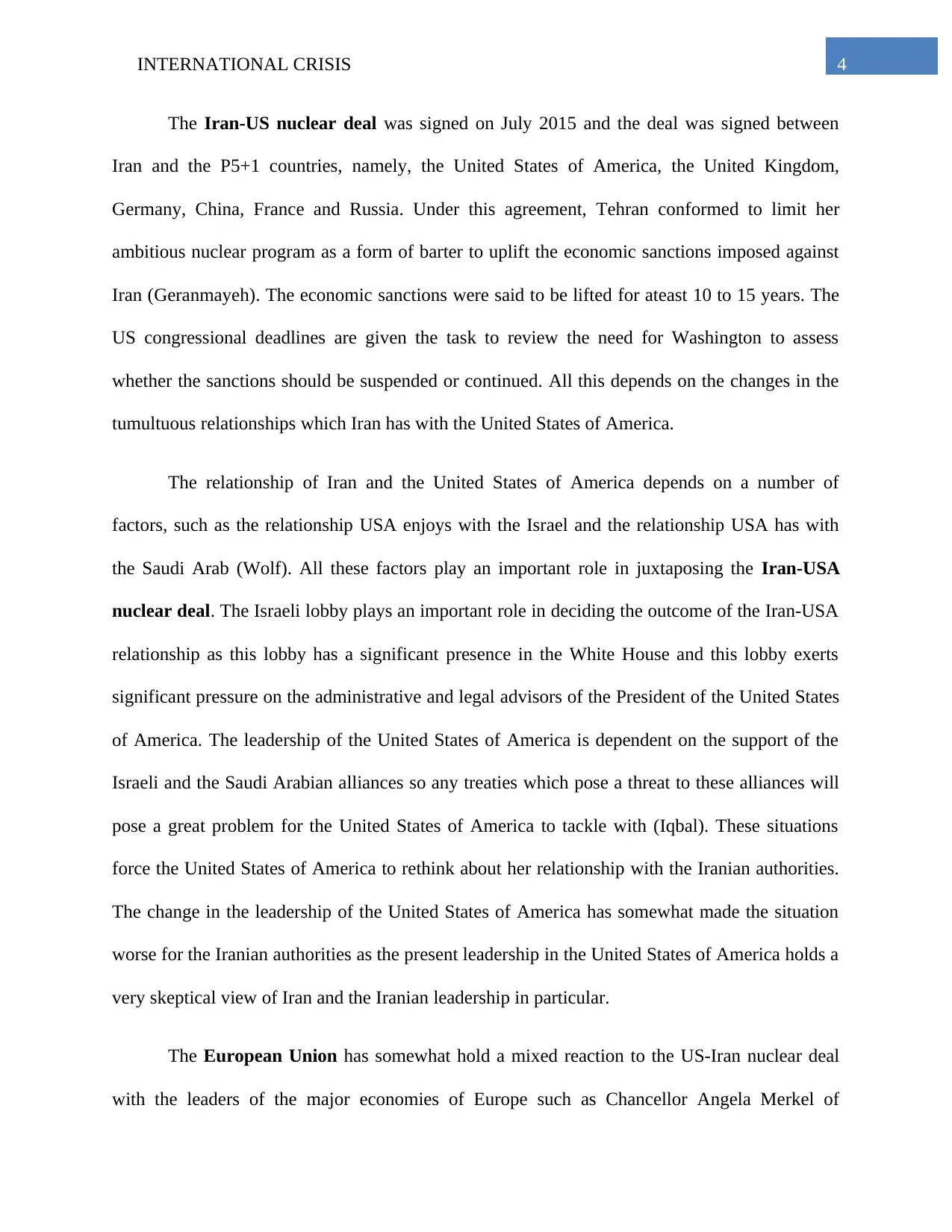
4INTERNATIONAL CRISIS
The Iran-US nuclear deal was signed on July 2015 and the deal was signed between
Iran and the P5+1 countries, namely, the United States of America, the United Kingdom,
Germany, China, France and Russia. Under this agreement, Tehran conformed to limit her
ambitious nuclear program as a form of barter to uplift the economic sanctions imposed against
Iran (Geranmayeh). The economic sanctions were said to be lifted for ateast 10 to 15 years. The
US congressional deadlines are given the task to review the need for Washington to assess
whether the sanctions should be suspended or continued. All this depends on the changes in the
tumultuous relationships which Iran has with the United States of America.
The relationship of Iran and the United States of America depends on a number of
factors, such as the relationship USA enjoys with the Israel and the relationship USA has with
the Saudi Arab (Wolf). All these factors play an important role in juxtaposing the Iran-USA
nuclear deal. The Israeli lobby plays an important role in deciding the outcome of the Iran-USA
relationship as this lobby has a significant presence in the White House and this lobby exerts
significant pressure on the administrative and legal advisors of the President of the United States
of America. The leadership of the United States of America is dependent on the support of the
Israeli and the Saudi Arabian alliances so any treaties which pose a threat to these alliances will
pose a great problem for the United States of America to tackle with (Iqbal). These situations
force the United States of America to rethink about her relationship with the Iranian authorities.
The change in the leadership of the United States of America has somewhat made the situation
worse for the Iranian authorities as the present leadership in the United States of America holds a
very skeptical view of Iran and the Iranian leadership in particular.
The European Union has somewhat hold a mixed reaction to the US-Iran nuclear deal
with the leaders of the major economies of Europe such as Chancellor Angela Merkel of
The Iran-US nuclear deal was signed on July 2015 and the deal was signed between
Iran and the P5+1 countries, namely, the United States of America, the United Kingdom,
Germany, China, France and Russia. Under this agreement, Tehran conformed to limit her
ambitious nuclear program as a form of barter to uplift the economic sanctions imposed against
Iran (Geranmayeh). The economic sanctions were said to be lifted for ateast 10 to 15 years. The
US congressional deadlines are given the task to review the need for Washington to assess
whether the sanctions should be suspended or continued. All this depends on the changes in the
tumultuous relationships which Iran has with the United States of America.
The relationship of Iran and the United States of America depends on a number of
factors, such as the relationship USA enjoys with the Israel and the relationship USA has with
the Saudi Arab (Wolf). All these factors play an important role in juxtaposing the Iran-USA
nuclear deal. The Israeli lobby plays an important role in deciding the outcome of the Iran-USA
relationship as this lobby has a significant presence in the White House and this lobby exerts
significant pressure on the administrative and legal advisors of the President of the United States
of America. The leadership of the United States of America is dependent on the support of the
Israeli and the Saudi Arabian alliances so any treaties which pose a threat to these alliances will
pose a great problem for the United States of America to tackle with (Iqbal). These situations
force the United States of America to rethink about her relationship with the Iranian authorities.
The change in the leadership of the United States of America has somewhat made the situation
worse for the Iranian authorities as the present leadership in the United States of America holds a
very skeptical view of Iran and the Iranian leadership in particular.
The European Union has somewhat hold a mixed reaction to the US-Iran nuclear deal
with the leaders of the major economies of Europe such as Chancellor Angela Merkel of
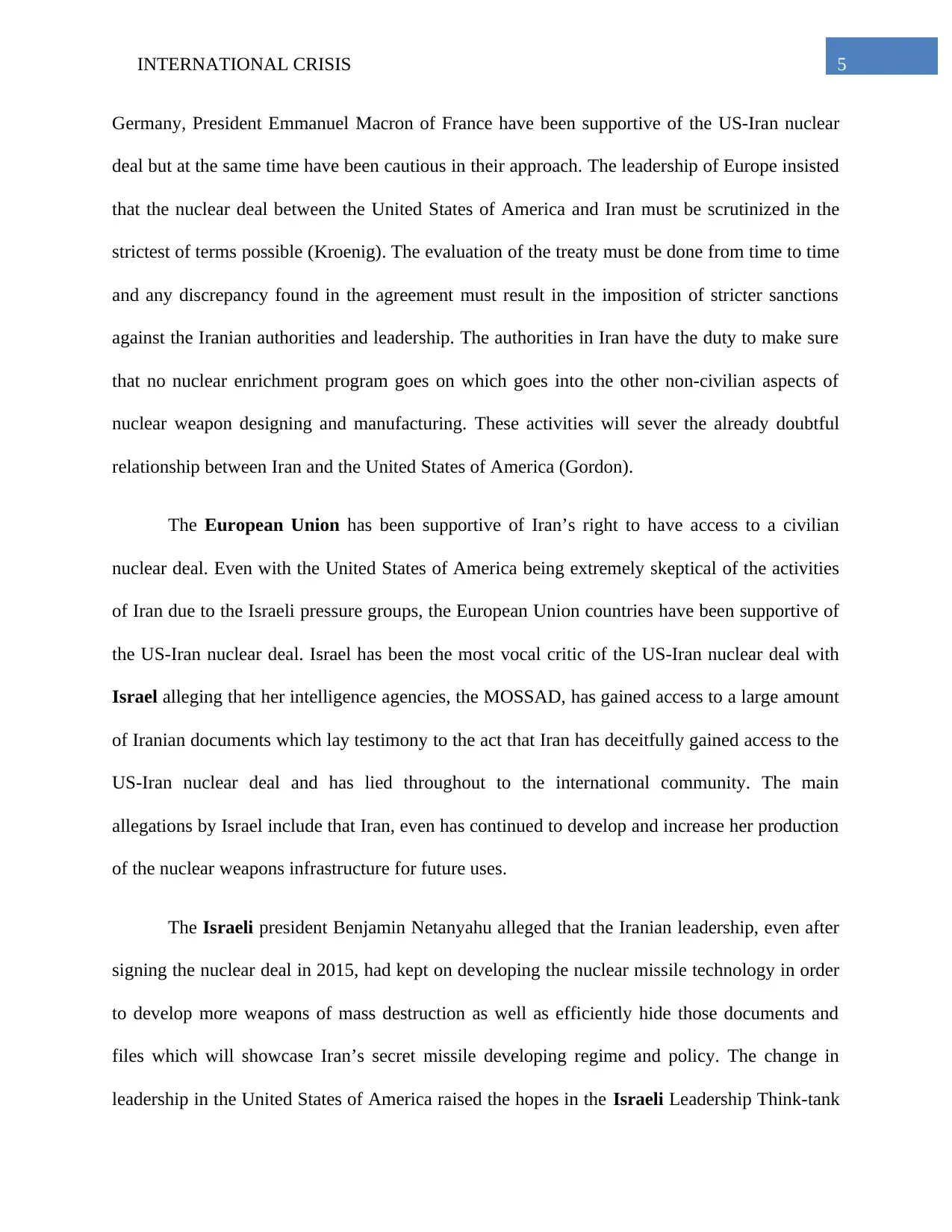
5INTERNATIONAL CRISIS
Germany, President Emmanuel Macron of France have been supportive of the US-Iran nuclear
deal but at the same time have been cautious in their approach. The leadership of Europe insisted
that the nuclear deal between the United States of America and Iran must be scrutinized in the
strictest of terms possible (Kroenig). The evaluation of the treaty must be done from time to time
and any discrepancy found in the agreement must result in the imposition of stricter sanctions
against the Iranian authorities and leadership. The authorities in Iran have the duty to make sure
that no nuclear enrichment program goes on which goes into the other non-civilian aspects of
nuclear weapon designing and manufacturing. These activities will sever the already doubtful
relationship between Iran and the United States of America (Gordon).
The European Union has been supportive of Iran’s right to have access to a civilian
nuclear deal. Even with the United States of America being extremely skeptical of the activities
of Iran due to the Israeli pressure groups, the European Union countries have been supportive of
the US-Iran nuclear deal. Israel has been the most vocal critic of the US-Iran nuclear deal with
Israel alleging that her intelligence agencies, the MOSSAD, has gained access to a large amount
of Iranian documents which lay testimony to the act that Iran has deceitfully gained access to the
US-Iran nuclear deal and has lied throughout to the international community. The main
allegations by Israel include that Iran, even has continued to develop and increase her production
of the nuclear weapons infrastructure for future uses.
The Israeli president Benjamin Netanyahu alleged that the Iranian leadership, even after
signing the nuclear deal in 2015, had kept on developing the nuclear missile technology in order
to develop more weapons of mass destruction as well as efficiently hide those documents and
files which will showcase Iran’s secret missile developing regime and policy. The change in
leadership in the United States of America raised the hopes in the Israeli Leadership Think-tank
Germany, President Emmanuel Macron of France have been supportive of the US-Iran nuclear
deal but at the same time have been cautious in their approach. The leadership of Europe insisted
that the nuclear deal between the United States of America and Iran must be scrutinized in the
strictest of terms possible (Kroenig). The evaluation of the treaty must be done from time to time
and any discrepancy found in the agreement must result in the imposition of stricter sanctions
against the Iranian authorities and leadership. The authorities in Iran have the duty to make sure
that no nuclear enrichment program goes on which goes into the other non-civilian aspects of
nuclear weapon designing and manufacturing. These activities will sever the already doubtful
relationship between Iran and the United States of America (Gordon).
The European Union has been supportive of Iran’s right to have access to a civilian
nuclear deal. Even with the United States of America being extremely skeptical of the activities
of Iran due to the Israeli pressure groups, the European Union countries have been supportive of
the US-Iran nuclear deal. Israel has been the most vocal critic of the US-Iran nuclear deal with
Israel alleging that her intelligence agencies, the MOSSAD, has gained access to a large amount
of Iranian documents which lay testimony to the act that Iran has deceitfully gained access to the
US-Iran nuclear deal and has lied throughout to the international community. The main
allegations by Israel include that Iran, even has continued to develop and increase her production
of the nuclear weapons infrastructure for future uses.
The Israeli president Benjamin Netanyahu alleged that the Iranian leadership, even after
signing the nuclear deal in 2015, had kept on developing the nuclear missile technology in order
to develop more weapons of mass destruction as well as efficiently hide those documents and
files which will showcase Iran’s secret missile developing regime and policy. The change in
leadership in the United States of America raised the hopes in the Israeli Leadership Think-tank
⊘ This is a preview!⊘
Do you want full access?
Subscribe today to unlock all pages.

Trusted by 1+ million students worldwide
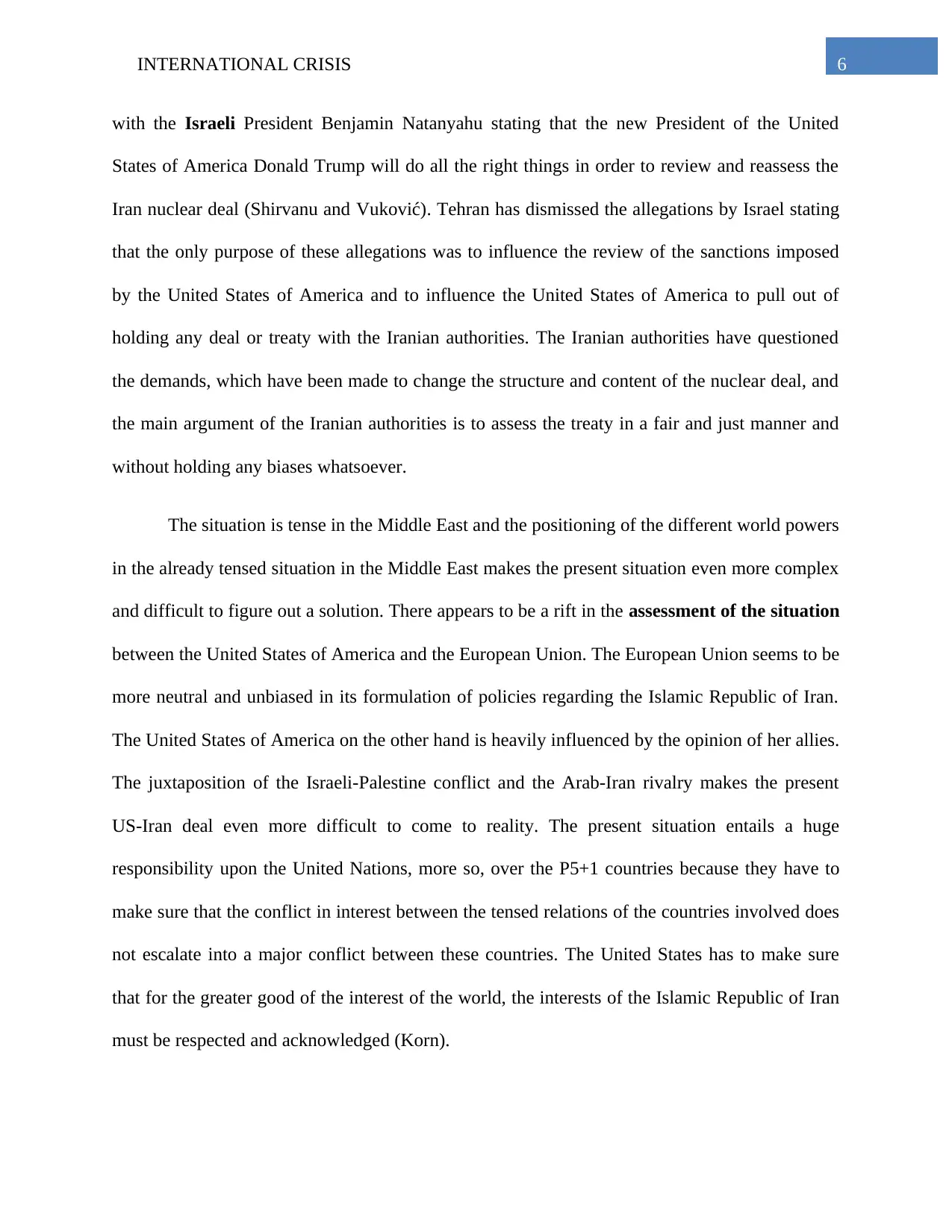
6INTERNATIONAL CRISIS
with the Israeli President Benjamin Natanyahu stating that the new President of the United
States of America Donald Trump will do all the right things in order to review and reassess the
Iran nuclear deal (Shirvanu and Vuković). Tehran has dismissed the allegations by Israel stating
that the only purpose of these allegations was to influence the review of the sanctions imposed
by the United States of America and to influence the United States of America to pull out of
holding any deal or treaty with the Iranian authorities. The Iranian authorities have questioned
the demands, which have been made to change the structure and content of the nuclear deal, and
the main argument of the Iranian authorities is to assess the treaty in a fair and just manner and
without holding any biases whatsoever.
The situation is tense in the Middle East and the positioning of the different world powers
in the already tensed situation in the Middle East makes the present situation even more complex
and difficult to figure out a solution. There appears to be a rift in the assessment of the situation
between the United States of America and the European Union. The European Union seems to be
more neutral and unbiased in its formulation of policies regarding the Islamic Republic of Iran.
The United States of America on the other hand is heavily influenced by the opinion of her allies.
The juxtaposition of the Israeli-Palestine conflict and the Arab-Iran rivalry makes the present
US-Iran deal even more difficult to come to reality. The present situation entails a huge
responsibility upon the United Nations, more so, over the P5+1 countries because they have to
make sure that the conflict in interest between the tensed relations of the countries involved does
not escalate into a major conflict between these countries. The United States has to make sure
that for the greater good of the interest of the world, the interests of the Islamic Republic of Iran
must be respected and acknowledged (Korn).
with the Israeli President Benjamin Natanyahu stating that the new President of the United
States of America Donald Trump will do all the right things in order to review and reassess the
Iran nuclear deal (Shirvanu and Vuković). Tehran has dismissed the allegations by Israel stating
that the only purpose of these allegations was to influence the review of the sanctions imposed
by the United States of America and to influence the United States of America to pull out of
holding any deal or treaty with the Iranian authorities. The Iranian authorities have questioned
the demands, which have been made to change the structure and content of the nuclear deal, and
the main argument of the Iranian authorities is to assess the treaty in a fair and just manner and
without holding any biases whatsoever.
The situation is tense in the Middle East and the positioning of the different world powers
in the already tensed situation in the Middle East makes the present situation even more complex
and difficult to figure out a solution. There appears to be a rift in the assessment of the situation
between the United States of America and the European Union. The European Union seems to be
more neutral and unbiased in its formulation of policies regarding the Islamic Republic of Iran.
The United States of America on the other hand is heavily influenced by the opinion of her allies.
The juxtaposition of the Israeli-Palestine conflict and the Arab-Iran rivalry makes the present
US-Iran deal even more difficult to come to reality. The present situation entails a huge
responsibility upon the United Nations, more so, over the P5+1 countries because they have to
make sure that the conflict in interest between the tensed relations of the countries involved does
not escalate into a major conflict between these countries. The United States has to make sure
that for the greater good of the interest of the world, the interests of the Islamic Republic of Iran
must be respected and acknowledged (Korn).
Paraphrase This Document
Need a fresh take? Get an instant paraphrase of this document with our AI Paraphraser
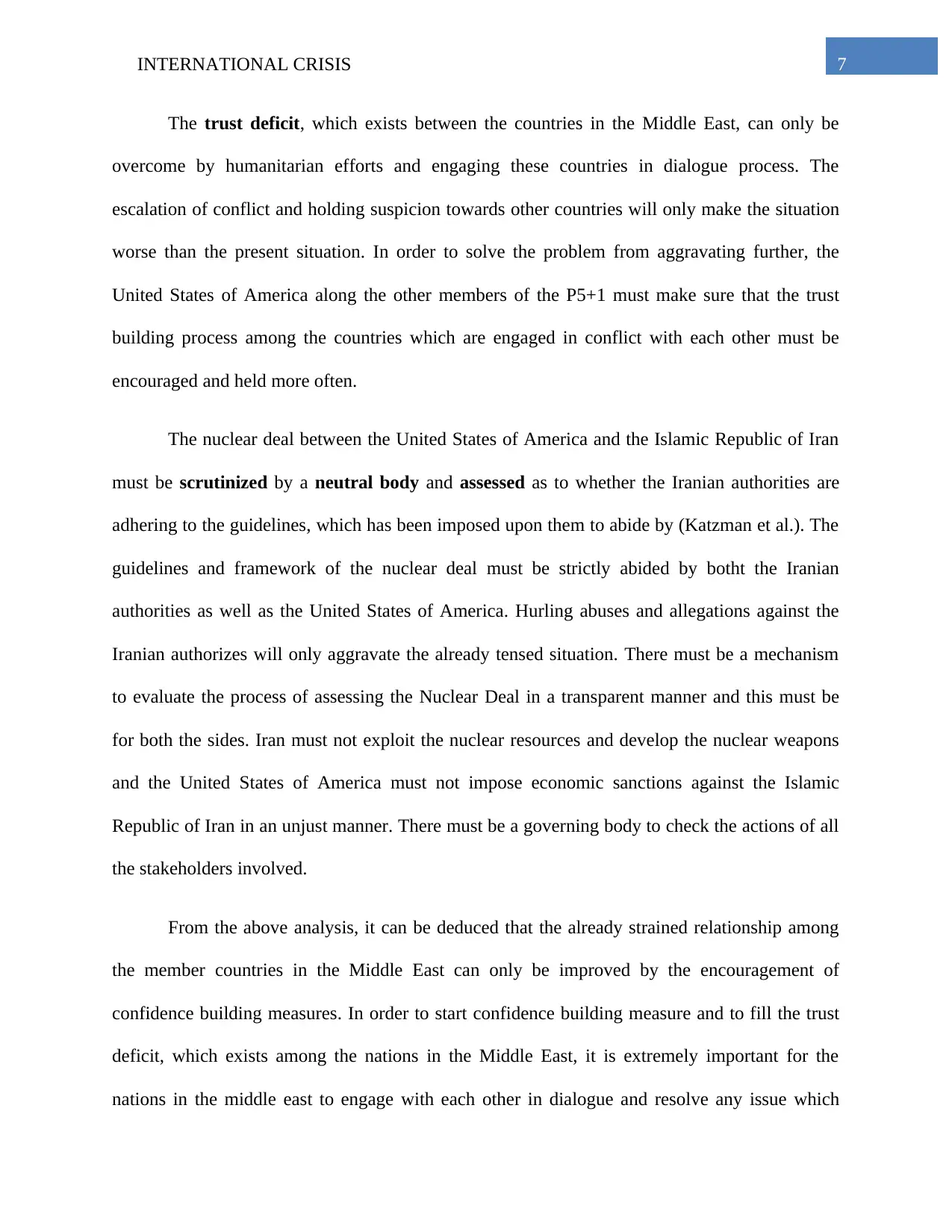
7INTERNATIONAL CRISIS
The trust deficit, which exists between the countries in the Middle East, can only be
overcome by humanitarian efforts and engaging these countries in dialogue process. The
escalation of conflict and holding suspicion towards other countries will only make the situation
worse than the present situation. In order to solve the problem from aggravating further, the
United States of America along the other members of the P5+1 must make sure that the trust
building process among the countries which are engaged in conflict with each other must be
encouraged and held more often.
The nuclear deal between the United States of America and the Islamic Republic of Iran
must be scrutinized by a neutral body and assessed as to whether the Iranian authorities are
adhering to the guidelines, which has been imposed upon them to abide by (Katzman et al.). The
guidelines and framework of the nuclear deal must be strictly abided by botht the Iranian
authorities as well as the United States of America. Hurling abuses and allegations against the
Iranian authorizes will only aggravate the already tensed situation. There must be a mechanism
to evaluate the process of assessing the Nuclear Deal in a transparent manner and this must be
for both the sides. Iran must not exploit the nuclear resources and develop the nuclear weapons
and the United States of America must not impose economic sanctions against the Islamic
Republic of Iran in an unjust manner. There must be a governing body to check the actions of all
the stakeholders involved.
From the above analysis, it can be deduced that the already strained relationship among
the member countries in the Middle East can only be improved by the encouragement of
confidence building measures. In order to start confidence building measure and to fill the trust
deficit, which exists among the nations in the Middle East, it is extremely important for the
nations in the middle east to engage with each other in dialogue and resolve any issue which
The trust deficit, which exists between the countries in the Middle East, can only be
overcome by humanitarian efforts and engaging these countries in dialogue process. The
escalation of conflict and holding suspicion towards other countries will only make the situation
worse than the present situation. In order to solve the problem from aggravating further, the
United States of America along the other members of the P5+1 must make sure that the trust
building process among the countries which are engaged in conflict with each other must be
encouraged and held more often.
The nuclear deal between the United States of America and the Islamic Republic of Iran
must be scrutinized by a neutral body and assessed as to whether the Iranian authorities are
adhering to the guidelines, which has been imposed upon them to abide by (Katzman et al.). The
guidelines and framework of the nuclear deal must be strictly abided by botht the Iranian
authorities as well as the United States of America. Hurling abuses and allegations against the
Iranian authorizes will only aggravate the already tensed situation. There must be a mechanism
to evaluate the process of assessing the Nuclear Deal in a transparent manner and this must be
for both the sides. Iran must not exploit the nuclear resources and develop the nuclear weapons
and the United States of America must not impose economic sanctions against the Islamic
Republic of Iran in an unjust manner. There must be a governing body to check the actions of all
the stakeholders involved.
From the above analysis, it can be deduced that the already strained relationship among
the member countries in the Middle East can only be improved by the encouragement of
confidence building measures. In order to start confidence building measure and to fill the trust
deficit, which exists among the nations in the Middle East, it is extremely important for the
nations in the middle east to engage with each other in dialogue and resolve any issue which
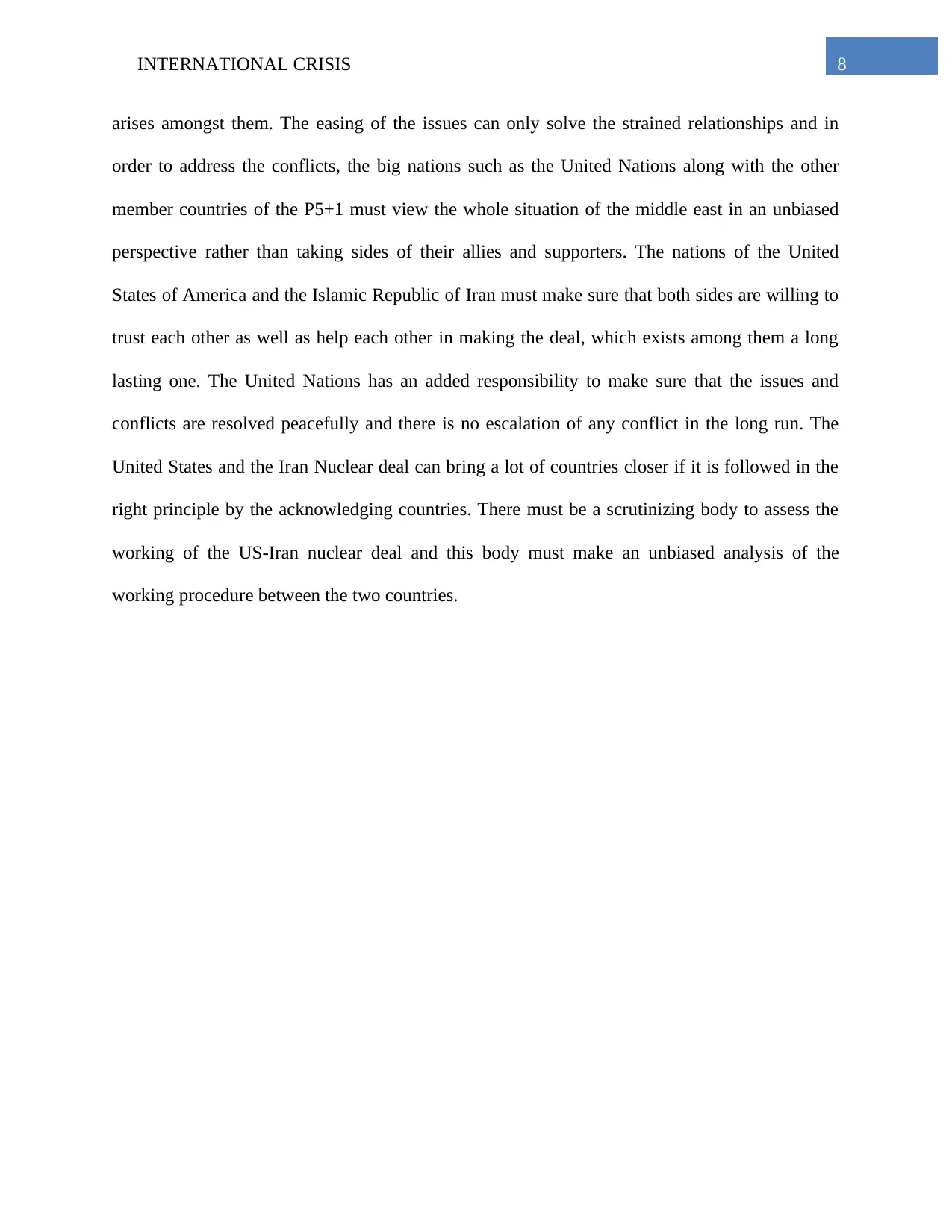
8INTERNATIONAL CRISIS
arises amongst them. The easing of the issues can only solve the strained relationships and in
order to address the conflicts, the big nations such as the United Nations along with the other
member countries of the P5+1 must view the whole situation of the middle east in an unbiased
perspective rather than taking sides of their allies and supporters. The nations of the United
States of America and the Islamic Republic of Iran must make sure that both sides are willing to
trust each other as well as help each other in making the deal, which exists among them a long
lasting one. The United Nations has an added responsibility to make sure that the issues and
conflicts are resolved peacefully and there is no escalation of any conflict in the long run. The
United States and the Iran Nuclear deal can bring a lot of countries closer if it is followed in the
right principle by the acknowledging countries. There must be a scrutinizing body to assess the
working of the US-Iran nuclear deal and this body must make an unbiased analysis of the
working procedure between the two countries.
arises amongst them. The easing of the issues can only solve the strained relationships and in
order to address the conflicts, the big nations such as the United Nations along with the other
member countries of the P5+1 must view the whole situation of the middle east in an unbiased
perspective rather than taking sides of their allies and supporters. The nations of the United
States of America and the Islamic Republic of Iran must make sure that both sides are willing to
trust each other as well as help each other in making the deal, which exists among them a long
lasting one. The United Nations has an added responsibility to make sure that the issues and
conflicts are resolved peacefully and there is no escalation of any conflict in the long run. The
United States and the Iran Nuclear deal can bring a lot of countries closer if it is followed in the
right principle by the acknowledging countries. There must be a scrutinizing body to assess the
working of the US-Iran nuclear deal and this body must make an unbiased analysis of the
working procedure between the two countries.
⊘ This is a preview!⊘
Do you want full access?
Subscribe today to unlock all pages.

Trusted by 1+ million students worldwide
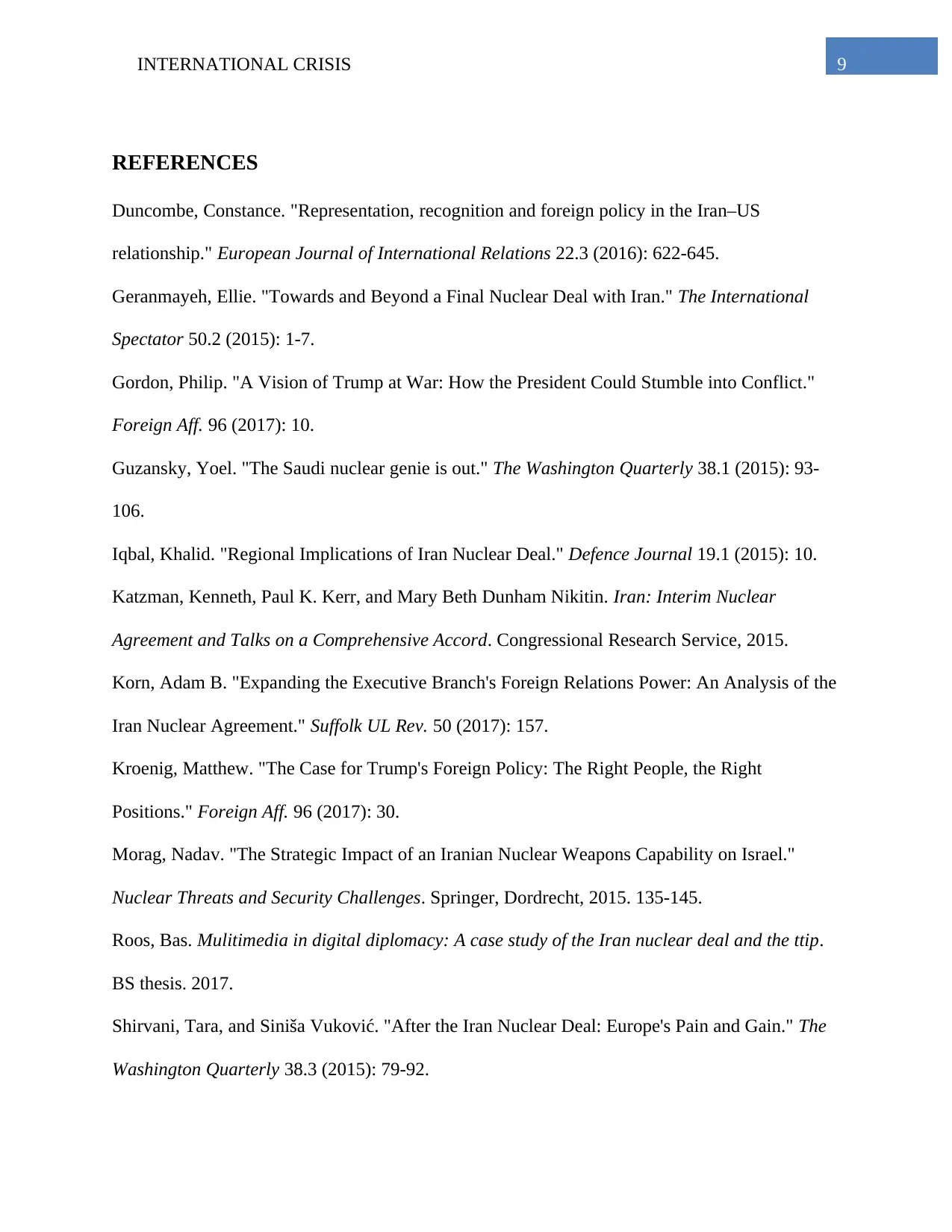
9INTERNATIONAL CRISIS
REFERENCES
Duncombe, Constance. "Representation, recognition and foreign policy in the Iran–US
relationship." European Journal of International Relations 22.3 (2016): 622-645.
Geranmayeh, Ellie. "Towards and Beyond a Final Nuclear Deal with Iran." The International
Spectator 50.2 (2015): 1-7.
Gordon, Philip. "A Vision of Trump at War: How the President Could Stumble into Conflict."
Foreign Aff. 96 (2017): 10.
Guzansky, Yoel. "The Saudi nuclear genie is out." The Washington Quarterly 38.1 (2015): 93-
106.
Iqbal, Khalid. "Regional Implications of Iran Nuclear Deal." Defence Journal 19.1 (2015): 10.
Katzman, Kenneth, Paul K. Kerr, and Mary Beth Dunham Nikitin. Iran: Interim Nuclear
Agreement and Talks on a Comprehensive Accord. Congressional Research Service, 2015.
Korn, Adam B. "Expanding the Executive Branch's Foreign Relations Power: An Analysis of the
Iran Nuclear Agreement." Suffolk UL Rev. 50 (2017): 157.
Kroenig, Matthew. "The Case for Trump's Foreign Policy: The Right People, the Right
Positions." Foreign Aff. 96 (2017): 30.
Morag, Nadav. "The Strategic Impact of an Iranian Nuclear Weapons Capability on Israel."
Nuclear Threats and Security Challenges. Springer, Dordrecht, 2015. 135-145.
Roos, Bas. Mulitimedia in digital diplomacy: A case study of the Iran nuclear deal and the ttip.
BS thesis. 2017.
Shirvani, Tara, and Siniša Vuković. "After the Iran Nuclear Deal: Europe's Pain and Gain." The
Washington Quarterly 38.3 (2015): 79-92.
REFERENCES
Duncombe, Constance. "Representation, recognition and foreign policy in the Iran–US
relationship." European Journal of International Relations 22.3 (2016): 622-645.
Geranmayeh, Ellie. "Towards and Beyond a Final Nuclear Deal with Iran." The International
Spectator 50.2 (2015): 1-7.
Gordon, Philip. "A Vision of Trump at War: How the President Could Stumble into Conflict."
Foreign Aff. 96 (2017): 10.
Guzansky, Yoel. "The Saudi nuclear genie is out." The Washington Quarterly 38.1 (2015): 93-
106.
Iqbal, Khalid. "Regional Implications of Iran Nuclear Deal." Defence Journal 19.1 (2015): 10.
Katzman, Kenneth, Paul K. Kerr, and Mary Beth Dunham Nikitin. Iran: Interim Nuclear
Agreement and Talks on a Comprehensive Accord. Congressional Research Service, 2015.
Korn, Adam B. "Expanding the Executive Branch's Foreign Relations Power: An Analysis of the
Iran Nuclear Agreement." Suffolk UL Rev. 50 (2017): 157.
Kroenig, Matthew. "The Case for Trump's Foreign Policy: The Right People, the Right
Positions." Foreign Aff. 96 (2017): 30.
Morag, Nadav. "The Strategic Impact of an Iranian Nuclear Weapons Capability on Israel."
Nuclear Threats and Security Challenges. Springer, Dordrecht, 2015. 135-145.
Roos, Bas. Mulitimedia in digital diplomacy: A case study of the Iran nuclear deal and the ttip.
BS thesis. 2017.
Shirvani, Tara, and Siniša Vuković. "After the Iran Nuclear Deal: Europe's Pain and Gain." The
Washington Quarterly 38.3 (2015): 79-92.
Paraphrase This Document
Need a fresh take? Get an instant paraphrase of this document with our AI Paraphraser
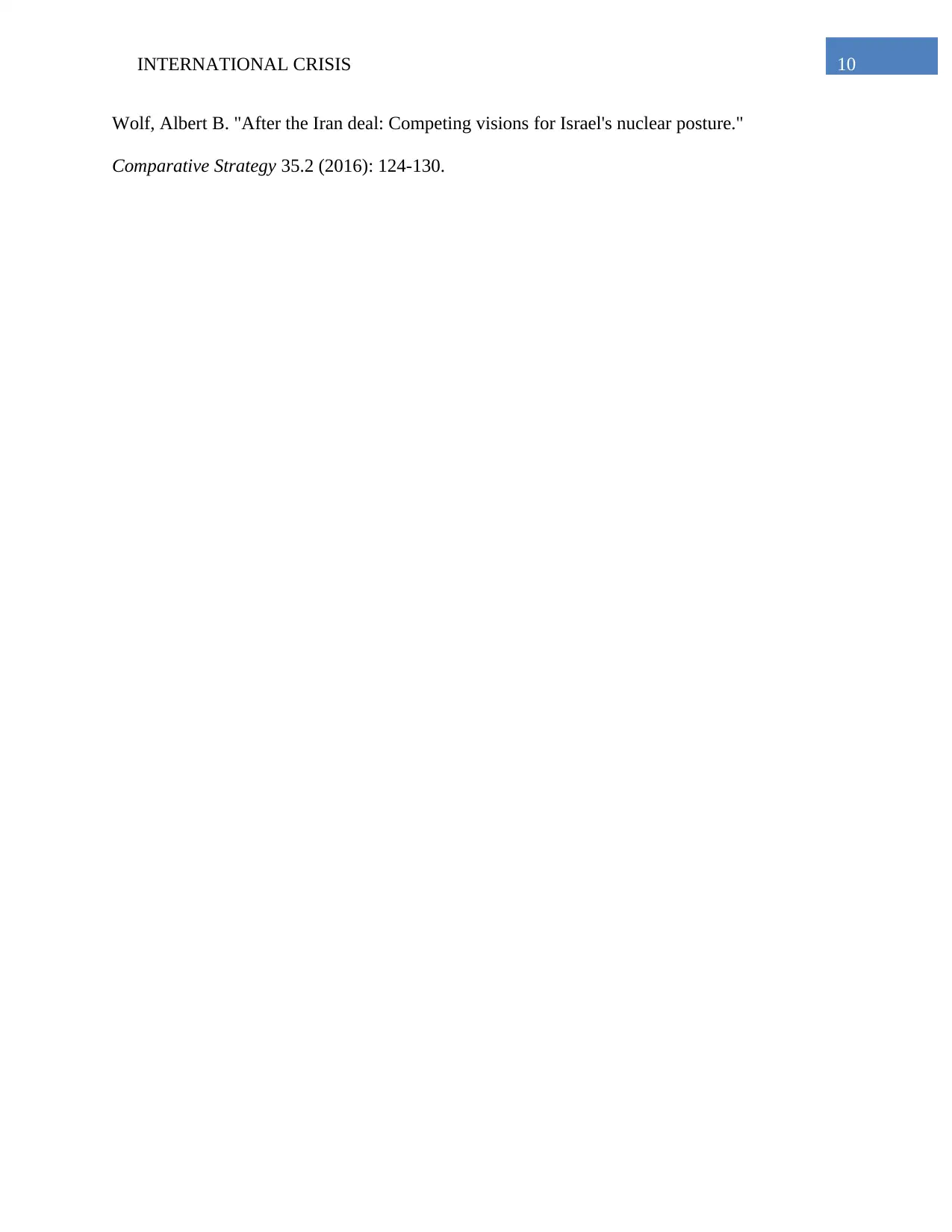
10INTERNATIONAL CRISIS
Wolf, Albert B. "After the Iran deal: Competing visions for Israel's nuclear posture."
Comparative Strategy 35.2 (2016): 124-130.
Wolf, Albert B. "After the Iran deal: Competing visions for Israel's nuclear posture."
Comparative Strategy 35.2 (2016): 124-130.
1 out of 11
Related Documents
Your All-in-One AI-Powered Toolkit for Academic Success.
+13062052269
info@desklib.com
Available 24*7 on WhatsApp / Email
![[object Object]](/_next/static/media/star-bottom.7253800d.svg)
Unlock your academic potential
Copyright © 2020–2026 A2Z Services. All Rights Reserved. Developed and managed by ZUCOL.



